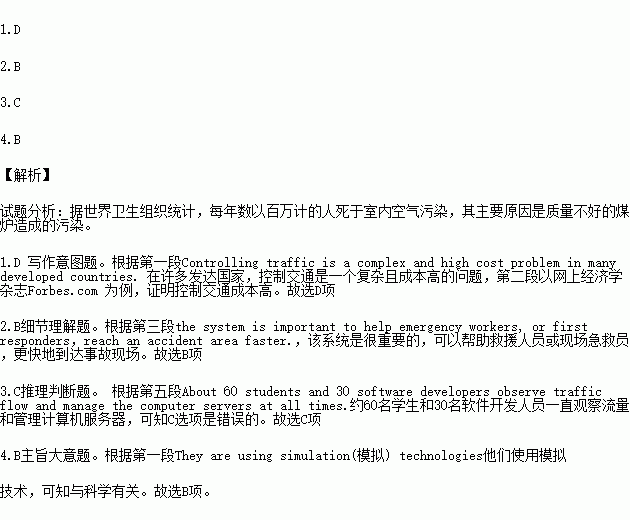题目内容
Controlling traffic is a complex and high cost problem in many developed countries. It becomes more difficult and costly with the ever- increasing number of cars on the roads. But scientists and students at the CATT, at the University of Maryland are working to solve this problem. They are using simulation(模拟) technologies to help government and private business control and react to changing traffic conditions.
The online economics magazine Forbes.com says traffic congestion(拥挤) cost Americans $ 124 billion in 2014 and that number could rise to $ 186 billion by 2030.
Bui scientists at the CATT lab are trying to reduce those costs. They are developing a system that helps traffic managers. planners, emergency workers and businesses plan and react better. Michael Pack is CATT director. He says the system is important to help emergency workers, or first responders,reach an accident area faster.
The CATT Lab collects information from many sources, including roadside devices, GPS (global positioning system) equipment and wireless phones.
About 60 students and 30 software developers observe traffic flow and manage the computer servers at all times. They also work to develop software and applications that can help traffic run smoother and safer, Some of them turn the information gathered into so-called "visualizations". These visual representations help emergency workers better understand what is happening.
The center shares its findings with firefighters, police,Transportation departments and the military. They also share information with universities and transportation company. The technology company Google uses the data for its traffic-related websites. Michael Pack says, the information is then shared with anyone who wants to help traffic run more smoothly.
Mr. Pack says the goal is to help develop an intelligent system of road signals that will communicate with each other and with vehicles on the road.
1.The second paragraph is written to
A. attract more people to look through Forbes.com.
B. tell readers what Forbes.com says on its website
C. show how much money controlling costs America
D. prove it is very expensive for some developed countries to control traffic
2.What benefit can emergency workers get from the system developed by the CATT lab?
A. They can be safer.
B. They can reach an accident area faster.
C. They can get more advice from people.
D. They can share their information with others.
3.Which of the following is NOT true about the developers and the students at the CATT?
A. They observe traffic flow continuously.
B. They develop software and applications.
C. They control the computer servers occasionally.
D. They change the information gathered into visual image.
4.1n which column of the newspaper can you read this text?
A. Daily life. B. Science. C. Education. D. Exploration.

